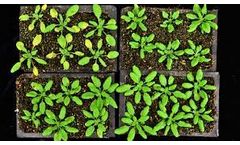Biotechnology Applications In Turkish Agriculture Articles & Analysis
67 articles found
In agricultural biotechnology and plant physiology, fatty acids quantification plays a critical role in understanding metabolic pathways, lipid biosynthesis, and nutritional value. Researchers are increasingly interested in the fatty acid composition of crops and microalgae to improve yield, oil quality, and stress resistance. As the demand for bio-based solutions rises, precise measurement of ...
Plant hormones, or phytohormones, are crucial biochemical regulators in plants, orchestrating growth, development, and responses to environmental stimuli. These naturally occurring substances are produced in one part of the plant and transported to other parts, where they elicit specific developmental responses. Understanding plant hormones is crucial for improving agricultural practices, ...
Introduction of Pheromone Solid-phase Synthesis Pheromones are a fascinating class of molecules that are used by many organisms, including insects and mammals, to communicate with one another. They are chemical signals that convey information about an individual's identity, reproductive status, and location, among other things. The synthesis of pheromones is a complex process that requires a deep ...
Plants are constantly attacked by bacteria, viruses and other pathogens. When a plant senses a microbial invasion, fundamental changes occur in the chemical soup of proteins inside its cells, the workhorses of life. In a new study published in Cell, Duke University researchers have uncovered a key ingredient in plant cells that reprograms their protein-making machinery to fight disease. Crop ...
The last few years have witnessed explosive growth within biotechnology across all segments of the industry. It is estimated that the global biotech market will command $727.1 Billion USD by 2025. Biotech looks poised to continue this meteoric growth for 2019 and beyond. With Compounded Annual Growth rates (CAGR) rates across segments ranging from 6%-11%, here is a look at key segments within ...
Abstract Agricultural biotechnology has some controversy impacts on global economy and international regulations. But, it has enhanced the production of crops and foods with high nutritious. Some time, it has not secured human and environmental safety, intellectual property rights, consumer choice, ethics, food security, poverty reduction and environmental conservation. Even though, it has ...
There are 13 research institutes under the GDAAS, including specific foods and crops and fertilizer research. The main mission of the institution is to carry out non-profit research around agricultural science and techniques. As one of the most important agricultural crops institutions, the Crops Research Institute has been focusing on the development of new varieties of crops, cultivation ...
According to a Federal Register notice published on February 5, 2016, 81 Fed. Reg. 6225, the U.S. Department of Agriculture's (USDA) Animal and Plant Health Inspection Service (APHIS) announced its intent to "prepare a programmatic environmental impact statement (EIS) in connection with potential changes to the regulations regarding the importation, interstate movement, and environmental release ...
On November 19, 2015, USDA published a Notice of the Advisory Committee on Biotechnology and 21st Century Agriculture (AC21) Meeting in the Federal Register. The meeting will review the purpose, history, operational process, and member responsibilities of AC21; update committee members on relevant regulatory developments, initiatives, and USDA activities; and outline new tasks for the committee ...
Take part in our online debate that will take place on this page on 9 June starting at 1pm British Summer Time (GMT+1). Over two hours, our expert panel will help steer a discussion on why farmers in developing countries are not improving productivity by adopting a greater number of innovative technologies. Delivering food security for everyone on the planet is a monumental challenge. The global ...
In August, India’s ruling nationalist Bharatiya Janata Party (BJP) stopped its legislators from accepting Monsanto sponsorship to attend a farm exhibition in the US state of Iowa. On the surface this might seem strange: attending the Farm Progress Show should be innocuous, as Monsanto routinely takes farmers, industry experts, media and MPs from various countries to visit the show and ...
New evidence shows that arguments against GM crops are unfounded, says Margaret Karembu. The year 2013 marked the 18th consecutive year of commercial cultivation of genetically modified organisms (GMOs) or now commonly referred to as biotech crops. And in just under two decades, the volume of land on which biotech crops are grown has increased from 1.7 million hectares in 1996 — the first ...
A substantial and growing body of literature now exists on the socio–economic impacts of genetically engineered (GE) crops. While the bulk of literature has focused on the primary impacts of commercialised GE technology, in terms of changes in yields, costs and profitability, researchers have increasingly addressed a range of additional questions such as the distribution of impacts across groups, ...
Universities play important roles in socio–economic development by contributing to the advancement and dissemination of new knowledge, and developing human capacity. African agriculture has the lowest yield and productivity compared to the rest of the world. The continent is the most food insecure and has the highest youth unemployment. Transforming smallholder agriculture into industrial ...
Agricultural biotechnology is expanding around the world, but societal acceptance remains an important issue. Michigan State University (MSU) has developed and implemented an agricultural biotechnology short course for developing countries. Four courses were taught to regional groups in 2002–2003 and eight more were taught to geographically diverse groups in 2004–2008. One half day of each course ...
Industrial biotechnology is an emerging industry in which firms are developing novel alternatives to petroleum–based goods. Canadian–based firms have an opportunity to capitalise on the availability of biomass from Canadian agriculture and Canada's broad resource base. However, complexity of the product development process coupled with immaturity of this industry means little is currently known ...
This paper provides an assessment of the economic impact at the farm level of agricultural biotechnology on global agriculture. It examines the economic impacts on yields, key costs of production, direct farm income, indirect (non-pecuniary) farm level income effects and impacts on the production base of the four main crops of soybeans, corn, cotton and canola. The analysis shows that there have ...
This paper provides an assessment of the economic impact at the farm level of agricultural biotechnology on global agriculture. It examines the economic impacts on yields, key costs of production, direct farm income, indirect (non-pecuniary) farm level income effects and impacts on the production base of the four main crops of soybeans, corn, cotton and canola. The analysis shows that there have ...
Rising food prices and the associated political upheavals have rekindled interest in international cooperation on food security in particular and economic development in general. This paper argues that efforts to promote food security in sub-Saharan Africa need take into account three key issues: food security is inseparable from economic development; science and innovation are a necessary part ...
Department of Agricultural Biotechnology, University of Florence, Piazzale delle Cascine 24, 1-50144, Florence, Italy; IBMC-Instituto de Biologia Molecular e Celular, Universidade do Porto, Rua do Campo Alegre 823, 4150-180 Porto, Portugal; Departamento de Botânica, Faculdade de Ciências, Universidade do Porto, Rua do Campo Alegre 1191, 4150-181 Porto, Portugal; and Instituto de Ciências ...











